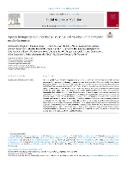Agency in urgency and uncertainty. Vaccines and vaccination in European media discourses

Author
Wagner, Aleksandra
Paulina, Polak
Rudek, Tadeusz
Świątkiewicz-Mośny, Maria
Anderson, Alistair
Bockstal, Marlies
Gariglio, Luigi
Hilário, Ana Patrícia
Hobson-West, Pru
Iorio, Juliana
Kuusipalo, Aappo
Scavarda, Alice
Alcântara da Silva, Pedro
Vuolanto, Pia
Publication date
2024Published in
Social Science and MedicineVolume / Issue
346 (April 2024)ISBN / ISSN
ISSN: 0277-9536ISBN / ISSN
eISSN: 1873-5347Funding Information
MSM//LX22NPO5101
EU/FP9/965280
Metadata
Show full item recordCollections
This publication has a published version with DOI 10.1016/j.socscimed.2024.116725
Abstract
Although Covid-19 was not the first pandemic, it was unique in the scale and intensity with which societies responded. Countries reacted differently to the threat posed by the new virus. The public health crisis affected European societies in many ways. It also influenced the way the media portrayed vaccines and discussed factors related to vaccine hesitancy. Europeans differed in their risk perceptions, attitudes towards vaccines and vaccine uptake. In European countries, Covid-19-related discourses were at the centre of media attention for many months. This paper reports on a media analysis which revealed significant differences as well as some similarities in the media debates in different countries. The study focused on seven European countries and considered two dimensions of comparison: between the pre-Covid period and the beginning of the Covid pandemic period, and between countries. The rich methodological approach, including linguistics, semantic field analysis and discourse analysis of mainstream news media, allowed the authors to explore the set of meanings related to vaccination that might influence actors' agency. This approach led the authors to redefine vaccine hesitancy in terms of characteristics of the "society in the situation" rather than the psychological profile of individuals. We argue that vaccine hesitancy can be understood in terms of agency and temporality. It is a dilemma of choice that transforms the present into an irreversible past and must be taken in relation to an uncertain future. As such, it is linked to how vaccine meaning is co-produced within public discourses.
Keywords
vaccine discourses, Vaccine hesitancy, Vaccination, media discourses
Permanent link
https://hdl.handle.net/20.500.14178/2442License
Full text of this result is licensed under: Creative Commons Uveďte původ 4.0 International






